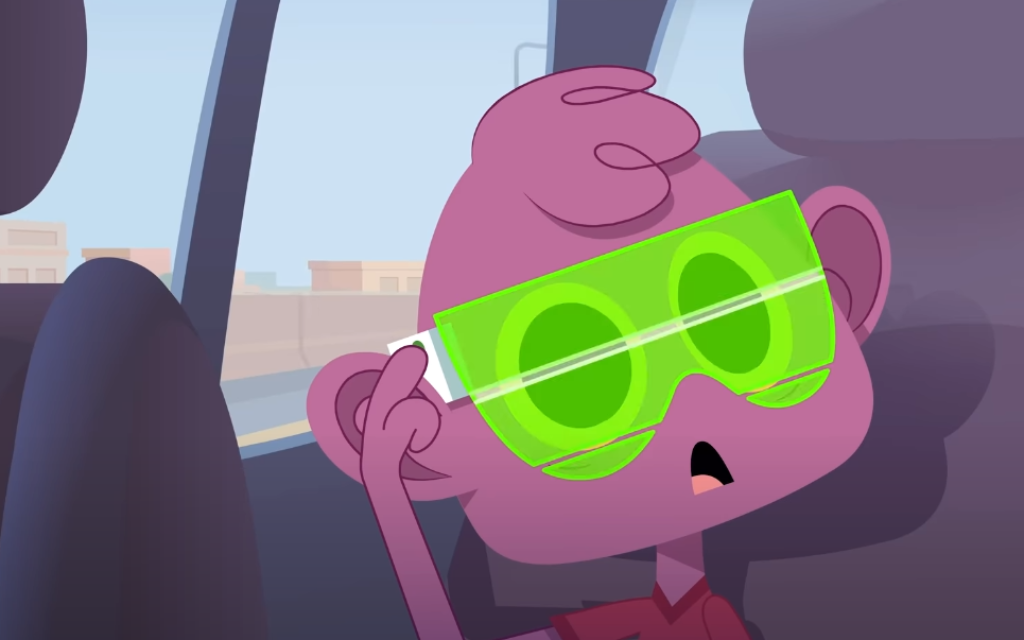
DOHA, Qatar (AFP) – A series of cartoons about an alien who crash-landed in Qatar, the host country of the World Cup, aims to ease a culture clash between more than a million foreign football fans and the people of this conservative state.
Like arriving fans, Kawkabani, star of the series launched by Qatar’s premier animation studio, must learn Arabic pronunciation, how to drink coffee and find out that Qataris cook way too much food for their guests.
Creators Hossein Heydar and Amal al-Shammari also want Qataris to get the message that they will have to make cultural concessions to the beer-drinking, good-time-seeking masses that converge on their country in November and December.
The first two 10-minute episodes of “Kawkabani” – which means “The Nobody’s Planet” in Arabic – have already been released on YouTube by their company, Nefaish Animation.
“As an animation studio, we looked at content from the region, even in Qatar, and we felt there was a lack of content that represents Qatari culture,” said Shammari, Creative Director of Nefaish. .
The Arabic words were sometimes scrambled and the costumes not always quite right.
“We felt we needed a studio in Qatar that pays attention to all of these details and represents Qatari culture in the right way,” he said.
This photograph taken on April 20, 2022 shows an exterior view of the al-Janoub Stadium in Doha, which will host matches for the 2022 FIFA World Cup. (Photo by KARIM JAAFAR / AFP)
The triumph of little Qatar in obtaining the right to host the World Cup gives it the opportunity to show its traditions and customs.
“We want to explain a lot of things and share our culture with visitors,” said Shammari, who wrote the screenplay.
Nefaish only hired artists from the Middle East with knowledge of Arab culture, added Heydar, in charge of animation.
Besides Kawkabani, the series has three main Qatari characters representing what the creators consider to be the main components of the 270,000 strong indigenous community, which lives alongside more than 2.5 million foreign workers.
coffee culture
Faisal is a traditional Bedouin community that inhabited the desert.
“You know they’re more proud of their culture, and sometimes they overreact,” Shammari said.
But “they would support you no matter what. They will always be there for you.
Saad, another of the Qatari characters, is a more “modern” city dweller. “He’s open to different cultures, he’s open to people, he wants to be a businessman,” the writer said.
As for Khalifa, he represents the growing mixed community in Qatar. Vegan, his mother is British and his father Qatari.
Each of the five episodes of the first series – translated into English, French, Spanish, Hindi, Mandarin Chinese and Japanese on YouTube – shows the Qatari way of life, especially food and drink.
Kawkabani gets in trouble for not knowing the right hand gesture used to indicate drinking too much coffee.

Illustrative: Qatari men sit in a street cafe next to two portraits of the Emir of Qatar, Sheikh Hamad bin Khalifa al-Thani, right, and his crown prince and son, Sheikh Tamim bin Hamad al-Thani, left, at Souk Wagef, in Doha, Qatar, January 16, 2011. (AP Photo/Hussein Malla)
But the series also pokes fun at Qataris.
With up to 1.4 million visitors expected in Qatar for the World Cup, Shammari said the cartoon seeks “to explain to Qataris that there has to be an acceptance of these cultures… and to help them ( visitors) to co-exist or understand Qatari culture as well”.
Kawkabani was partly funded by Qatar World Cup organizers Supreme Committee for Delivery and Legacy, as well as the Doha Film Institute and telecommunications giant Vodafone.
Although early programs did not address controversial issues such as the rights of migrant workers and women, Heydar insisted that there was complete artistic freedom.
“It’s our show and the sponsors have been very supportive of us and they’ve given us all the freedom to make it the way we see it,” he said.
The couple are already planning two more series of Kawkabani alongside other projects to showcase Arab culture.
“Our heritage is full of stories, full of characters, full of heroes and we want to present them from Qatar or the Arab region to the whole world,” he said.
